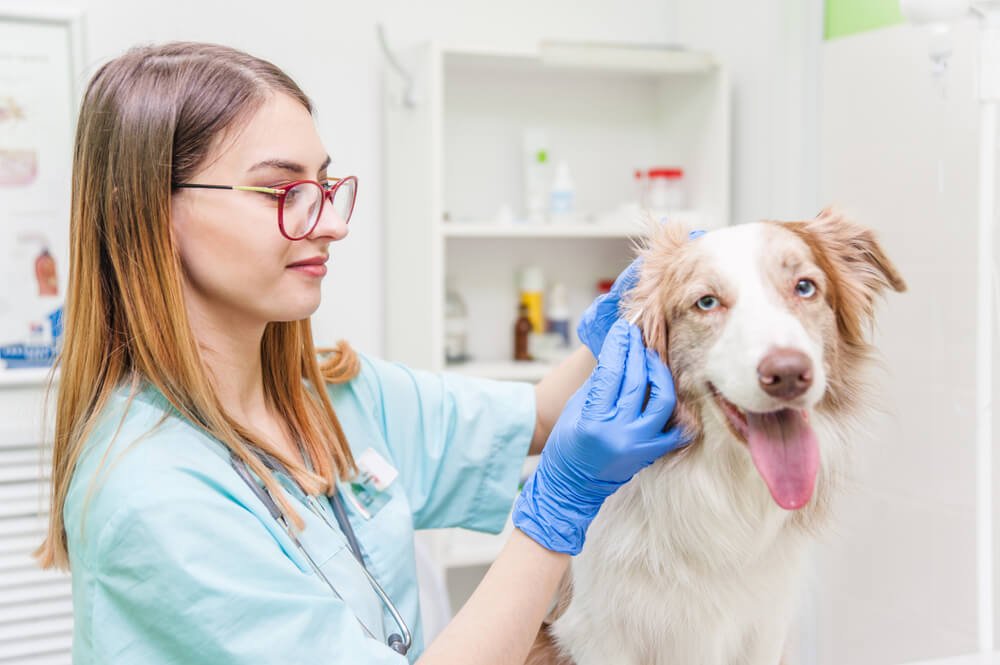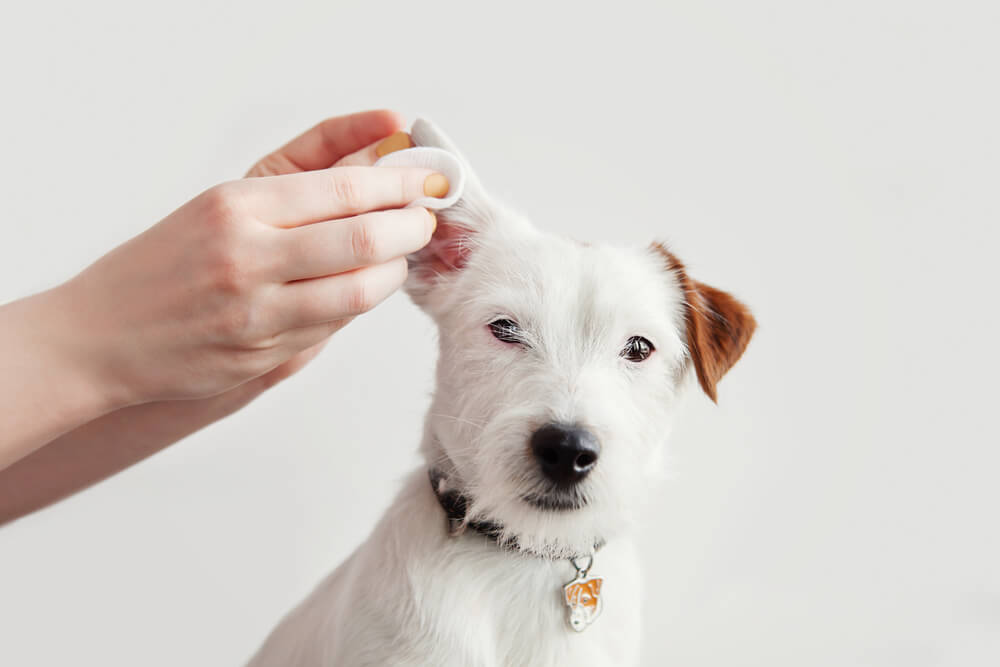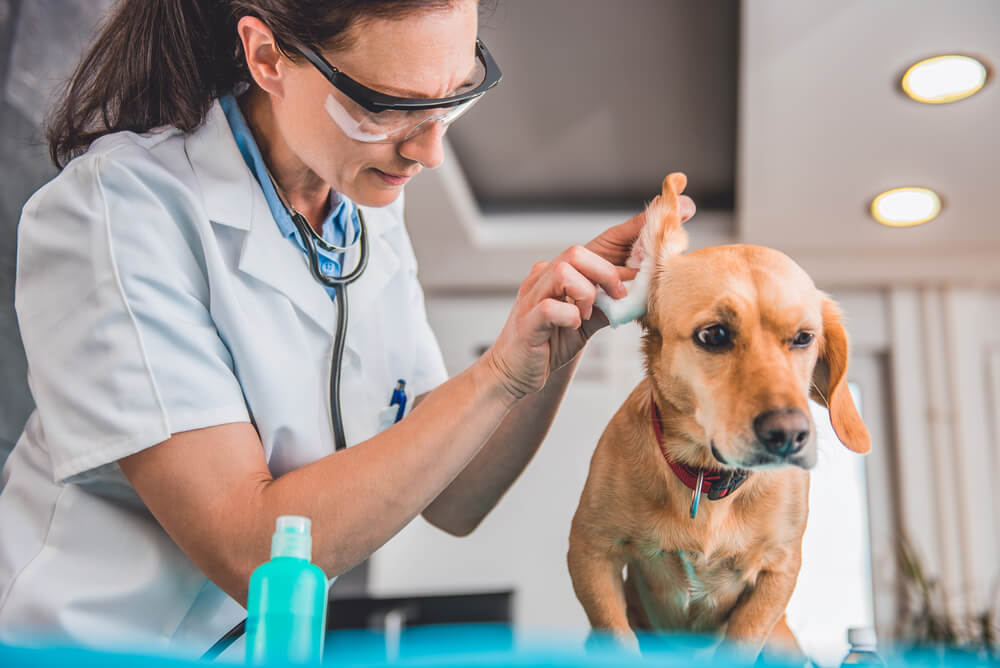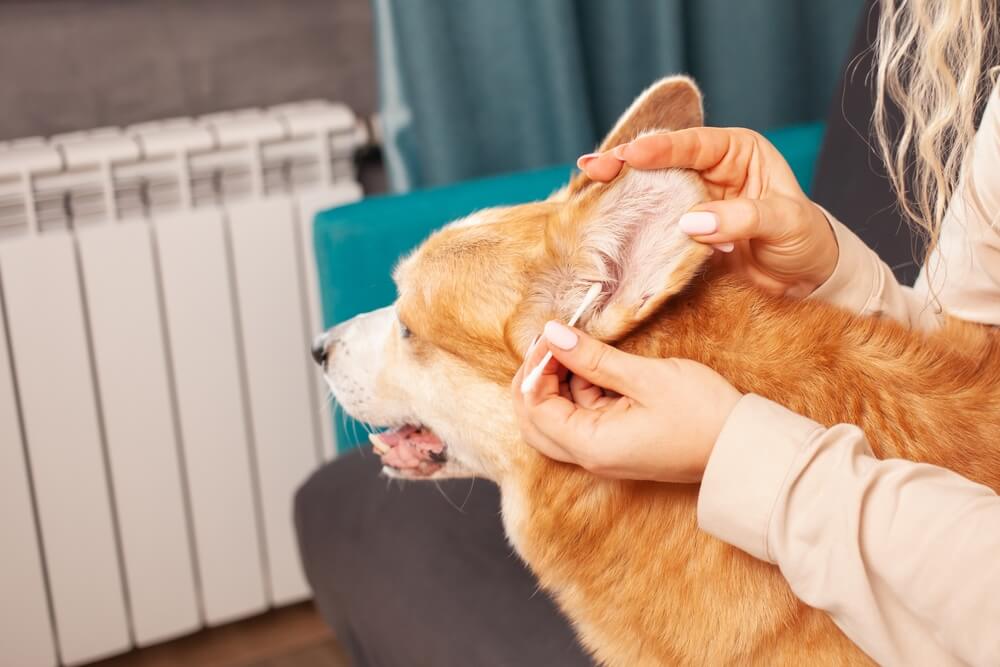
Ever noticed your dog scratching away at those ears and found an ear that looks red and gunky and has a bad odor? Then you know what an ear infection is like and how frustrating they can be.
In this article, we’ll discuss how to keep a pup from getting to this stage of a painful, nasty, smelly ear in the first place. Keep ear infections at bay by knowing what to look for, what causes them, and how they’re treated.
What Does a Dog Ear Infection Look Like?
If you haven’t encountered one before, a dog ear infection can have a few different appearances. Usually there is a combination of redness to the ear flap and white or tan to dark brown or black discharge and debris. Some dogs may show almost no signs of discomfort while others may be scratching, head-shaking, or whining. An ear infection may affect one or both ears.
True ear infections are caused either by fungal yeast, bacteria, or both. While mimicking ear infections, an ear mite infestation is a different condition and is treated differently.
What Causes a Dog Ear Infection?

Water exposure, those adorable floppy ears and different allergies could all be potential causes of your pup’s ear infections.
There are a few situations and conditions that can lead to an eventual itchy, smelly ear.
Water Exposure
The simplest cause can be from a dog getting water down one or both ears after swimming or getting a bath. Often, if related, the ear infection develops within about 2 weeks or less of water exposure.
Dogs have ear canals that are much longer than those of humans. When moisture and water get down into the deeper part of the canal, yeast and bacteria normally living there in small numbers can overgrow.
Floppy Ears
Dogs with long, floppy ears like hounds and spaniels can be at higher risk for ear infections. Their floppy ears can trap moisture and many breeds can have narrower ear canals. It may also be harder to notice an ear infection developing in these pups since the inside of the ear is not readily visible to pet parents at home.
Allergies
Underlying allergies are by far the most common cause of ear infections in dogs, especially if the ear infections are chronic and recurrent. Sensitivity to environmental allergens is very common, especially if a seasonal pattern is seen. If year-round issues are seen with recurrent infections, environmental allergens are still possible, but a food allergy also becomes a possibility as well. Another sign of dog allergies can be a rash on a dog’s belly which we’ve covered in another article.
How to Prevent Ear Infections in Dogs

Regular hygiene and proper nutrition could be some of the most effective prevention methods for ear infections in dogs.
We’ll now look at some ways to try to reduce the risk of ear infections occurring as a result of one of the above causes.
Water Exposure
You can’t keep your pup from going swimming, as most love it! Anytime your pup goes swimming, make sure to use an ear cleaner shortly after that has drying properties. This will help any standing water down in the ear to evaporate and not sit down there. In addition, when bathing, it can help to put a small wad of cotton just at the entrance of your dog’s ears. This will help to block water from getting down there in the first place. Don’t pack the cotton down too far to prevent easy removal.
Floppy Ears
Since you cannot “un-flop” your pup’s adorable droopy ears, the key is constant monitoring. Always make sure to flip up your dog’s ears a couple times a week, especially if he or she is prone to infections.
It also helps to get these pups on a regular ear cleaning regimen. It is best to use an approved ear cleaner for dogs or to ask your vet if a specific one may be needed. It is always best to ask your vet before a home remedy ear cleanser is used, as some ears may be too sensitive for commonly-found vinegar based solutions if ears are red or painful.
The best way to clean your pup’s ear is to insert a squirt or two of solution, then massage and squish the base of the ear. This helps to loosen debris adhered to the walls of the ear canal. After your pup gives a good shake, use cotton balls to clean out what you can see. While cotton swabs can be used to clean out the many intricate folds of the ear, they should not be used at home to clean deeper in the canal. This may only push material further down the ear and cause risk to the sensitive ear drum.
Allergies

Work with your vet to develop a specific allergy therapy and maybe also take other preventative medications available that work to lessen the allergy response.
Environmental allergens are hard to avoid and sometimes locking down the responsible allergens can be tough too. Allergy testing with your vet can help to develop specific allergy therapy and there are other preventative medications available that work to lessen the allergy response that contributes to recurrent ear infections.
If a food allergy is thought to be present, limited ingredient diets can be helpful. Reducing as many dietary variables as possible is important to rule out a culprit.
Food allergies are often implicated, so trying less common protein sources like turkey or pork and avoiding dairy, soy, or wheat gluten can be helpful.
Conclusion
While there can be several underlying causes to dog ear infections, a proper balanced diet with high quality whole food ingredients coupled with regular ear cleaning and checks can be the core to prevention.
Remember that ear infections can get out of hand quickly, so if basic cleaning does not appear to be helping your pup’s sore stinky ears, make sure to see your vet for an exam and medical treatment.
Frequently Asked Questions
- Why does my dog keep getting ear infections?
If your pup keeps getting infections over and over again, either the infection has never been fully resolved, or the true underlying cause has not been fully addressed. Your vet can help verify if an infection has been treated fully and help work on determining the underlying cause.
- What foods cause ear infections in dogs?
There is not one single food or group of foods that cause ear infections. Some dogs with allergies to certain ingredients can develop skin and ear allergy conditions that contribute to recurrent ear infections.
- What foods prevent ear infections in dogs?
If recurrent ear infections are caused by an underlying food allergy, try feeding a limited ingredient diet that has a single protein source.
- Is there a natural remedy for dog ear infections?
There is no one single remedy, as recurrent ear infections can have several underlying causes. Your vet can help you determine the underlying cause and best treatment.


